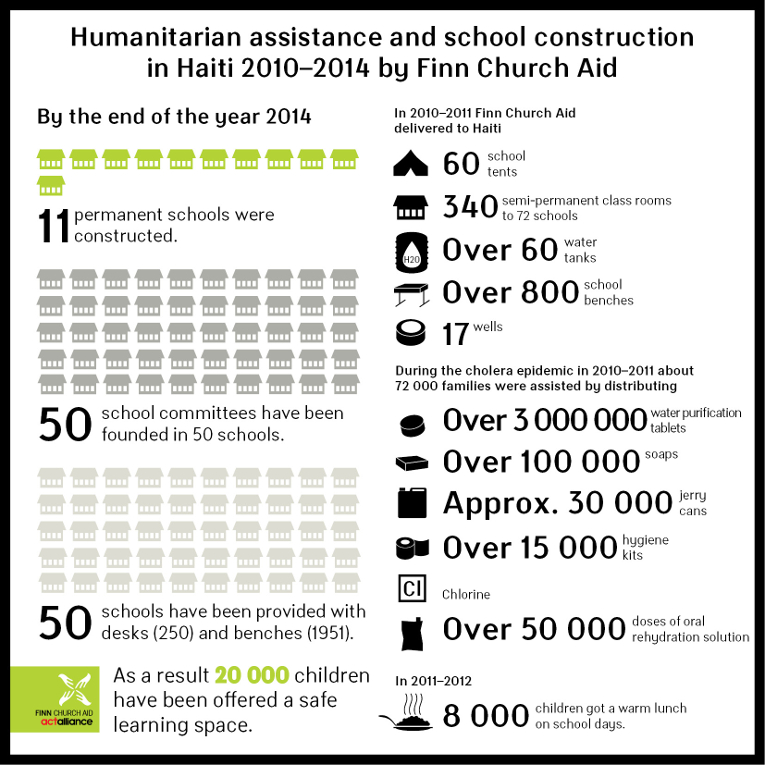Five years after devastating earthquake – Haiti is still a fragile state
Five years ago, January 12th 2010, Haiti was shaken by a devastating earthquake. It killed over 200.000 people and left two million homeless. The earthquake was followed by a major cholera epidemic. The political instability and fragile social structures have hindered the reconstruction of the country.
Apart from the presidential elections, no other elections have been called since the earthquake. The legislative elections were supposed to take place over three years ago, and after January 12th the congress will no longer be competent to enact legislation.
“New antigovernment demonstrations are expected as well as socioeconomically motivated demonstrations”, says Uluç Baslanti, Finn Church Aid’s Regional Representative for Latin America and the Caribbean in Port-au-Prince. The situation may indeed get more unstable, especially if the government is not able to install a new Prime Minister.
Since the Duvalier era the leaders of this country have never met their responsibilities and civil society has replaced the state as service provider, particularly in education. This is why Haiti was called a ‘NGO republic’ long before the earthquake. In the international emergency effort, the role of the government was largely ignored, of course also due to the fact that the government was absolutely incapable of functioning in the beginning.
“In order for Haiti to become a functioning state that could guarantee the rights of its citizens, the state should have a leading role in development and be accountable to its citizens for what it does or doesn’t do”, says Anna Salmivaara, Finn Church Aid’s Programme Manager in Haiti.
Currently most citizens, local organisations and authorities seem to see foreign NGOs and actors as duty bearers and expect for them to do the job. This way of thinking is hindering all positive development and creating additional dependency.
“NGOs should not replace neither the state nor the local civil society, but build their capacities. As local civil society becomes an active social actor that understands the role of the state, it is able to claim action and accountability from it. Awareness-raising of the roles of the state and citizens – rights and responsibilities – should be central”, Salmivaara says.
The right to education, among others, is not fulfilled for all. According to different estimates 80 to 90 percent of Haitian children are enrolled at school. However, only a quarter of children aged 12–17 still go to school. Finn Church Aid is committed to long-term action to support the fulfillment of the rights of Haitian people. Soon after the first emergency phase Finn Church Aid focused on education.
Finn Church Aid built 340 semi-permanent class rooms for over 70 schools. The majority of them are still functioning. Eleven permanent schools were finished by the end of the year 2014. Over 20.000 pupils have been offered safe learning spaces. School committees have been established in the schools to strengthen good governance and community involvement for improved quality of education. Finn Church Aid has also supported teacher training on human rights and disaster preparedness.
Finn Church Aid also supports the subsistence of rural communities – particularly adaptation to the effects of climate change and improving disaster preparedness. Finn Church Aid has had an office in Haiti’s capital Port-au-Prince since 2010.
For more information
Uluç Baslanti, Regional Representative for Latin America and the Caribbean, Port-au-Prince, tel. +509 3702 0399, uluc.baslanti@kua.fi,
Anna Salmivaara, Programme Manager, Port-au-Prince, tel. +509 3701 6322, anna.salmivaara@kua.fi,
Emmi Chaguaro, Regional Desk Officer for Latin America and the Caribbean, Helsinki, tel. +358 40 641 6173, emmi.chaguaro@kua.fi
Photo requests
Minna Elo, Communications Officer, tel. +358 50 330 9747, minna.elo@kua.fi
The time zone in Haiti is UTC/GMT-05:00.
